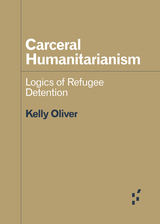
Coopted by military operations, humanitarianism has never been neutral. Rather than welcoming refugees, host countries assess the relative risks of taking them in versus turning them away, using a risk-benefit analysis that often reduces refugees to collateral damage in proxy wars fought in the war on terrorism. Carceral Humanitarianism testifies that humanitarian aid and human rights discourse are always political and partisan.
Forerunners is a thought-in-process series of breakthrough digital works. Written between fresh ideas and finished books, Forerunners draws on scholarly work initiated in notable blogs, social media, conference plenaries, journal articles, and the synergy of academic exchange. This is gray literature publishing: where intense thinking, change, and speculation take place in scholarship.
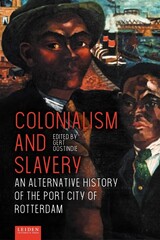
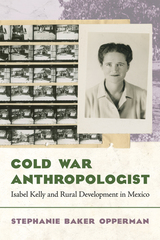
Kelly’s transition from a prominent archaeologist to a key figure in applied anthropology is meticulously chronicled, unveiling her pivotal role in shaping rural development strategies in Mexico amidst the geopolitical context of the Cold War. Through an extensive examination of her correspondence, archival material, and scholarly output, Kelly’s evolving viewpoints offer profound insights into the intricate dynamics of U.S.-Mexico relations and the challenges encountered by female academics during this era.
Organized chronologically, each chapter of this work delves into distinct facets of Kelly’s international journey, with a particular emphasis on her involvement in cooperative programs aimed at fostering diplomatic relations with Mexico. Through this narrative framework, readers are immersed in a compelling exploration of Kelly’s enduring impact on both the field of anthropology and the realm of international diplomacy.
This book is indispensable for historians, anthropologists, and individuals intrigued by the nuanced complexities of Cold War politics, presenting pioneering research at the intersection of history and anthropology. Opperman skillfully brings to light the previously untold narratives of Isabel Kelly, unveiling her influence on mid-twentieth-century Mexico.
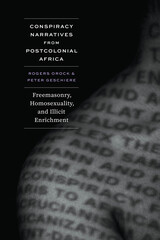
In this book, anthropologists Rogers Orock and Peter Geschiere examine the moral panic over a perceived rise in homosexuality that engulfed Cameroon and Gabon beginning in the early twenty-first century. As they uncover the origins of the conspiratorial narratives that fed this obsession, they argue that the public’s fears were grounded in historically situated assumptions about the entanglement of same-sex practices, Freemasonry, and illicit enrichment.
This specific panic in postcolonial Central Africa fixated on high-ranking Masonic figures thought to lure younger men into sex in exchange for professional advancement. The authors’ thorough account shows how attacks on elites as homosexual predators corrupting the nation became a powerful outlet for mounting populist anger against the excesses and corruption of the national regimes. Unraveling these tensions, Orock and Geschiere present a genealogy of Freemasonry, taking readers from London through Paris to Francophone Africa and revealing along the way how the colonial past was articulated with local assumptions linking same-sex practices to enrichment.


Ott provides an excellent ethnography of a French Basque agrarian and sheepherding community. The commune of Sainte-Engrâce extends along a mountain valley in the southeastern corner of Soule, one of the three Basque provences in France. In The Circle of Mountains, Sandra Ott examines the importance of cooperation and reciprocity as the essential basis for the main institutions within this community. These French Basques visualize their community as a circle, and their vision of living in "the circle of mountians," rather than in a valley, reflects their perspective on the society in which they live. The first half of the book incorporates material on history, ecology and economy, and delves deeply into the domestic organization, kinship, and neighborliness of this Basque community. In the second half of the book, the author introduces the males' customary roles as shepherds and cheesemakers. Following a detailed commentary on these vocations, Ott suggests that these seemingly prosaic activities represent the male attempt at symbolic fulfillment of the female procreative and nurturing roles. In a new afterword, Ott discusses developments that have impacted life in the pastoral community of Sainte-Engrâce since the original publication of the book—including the acquisition of telephones and the construction of roads to nearly every home.The Circle of Mountains will be of interest not only to social anthropologists but also to those concerned with the Basque language and culture and to scholars and students of ethnology, international studies, and political science.
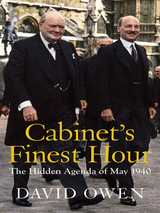
Eight months into the war, defeat seemed to many a certainty. With the United States still a year and half away from entering, Britain found itself in a perilous position, and foreign secretary Lord Halifax pushed prime minister Winston Churchill to explore the possibility of a negotiated peace with Hitler, using Mussolini as a conduit. Speaking for England is the story of Churchill’s triumph in the face of this pressure, but it is also about how collective debate and discussion won the day—had Churchill been alone, Owen argues, he would almost certainly have lost to Halifax, changing the course of history. Instead, the Cabinet system, all too often disparaged as messy and cumbersome, worked in Britain’s interests and ensured that a democracy on the brink of defeat had the courage to fight on.
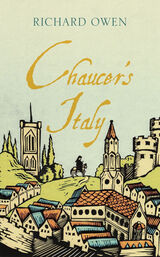
Geoffrey Chaucer might be considered the quintessential English writer, but he drew much of his inspiration and material from Italy. In fact, without the tremendous influence of Francesco Petrarch and Giovanni Boccaccio (among others), the author of The Canterbury Tales might never have assumed his place as the “father” of English literature. Nevertheless, Richard Owen’s Chaucer’s Italy begins in London, where the poet dealt with Italian merchants in his roles as court diplomat and customs official. Next Owen takes us, via Chaucer’s capture at the siege of Rheims, to his involvement in arranging the marriage of King Edward III’s son Lionel in Milan and his missions to Genoa and Florence. By scrutinizing his encounters with Petrarch, Boccaccio, and the mercenary knight John Hawkwood—and with vividly evocative descriptions of the Arezzo, Padua, Florence, Certaldo, and Milan that Chaucer would have encountered—Owen reveals the deep influence of Italy’s people and towns on Chaucer’s poems and stories. Much writing on Chaucer depicts a misleadingly parochial figure, but as Owen’s enlightening short study of Chaucer’s Italian years makes clear, the poet’s life was internationally eventful. The consequences have made the English canon what it is today.
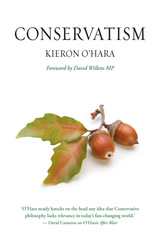
The term "conservative," when employed today in reference to politicians and beliefs, can denote groups as diverse and incompatible as the religious right, libertarians, and opponents of large, centralized government. Yet the original conservative philosophy, first developed in the eighteenth century by Edmund Burke, was most concerned with managing change. This kind of genuine conservatism has a renewed relevance in a complex world where change is rapid, pervasive, and dislocating.
In Conservatism, Kieron O’Hara presents a thought-provoking revision of the traditional conservative philosophy, here crafted for the modern age. As O’Hara argues, conservatism transcends traditional politics and has surprising applications—not least as the most appropriate and practical response to climate change. He shows what a properly conservative ideology looks like today, and draws on such great conservative thinkers as Burke and Adam Smith, philosophers from Plato to Wittgenstein, and contemporary social commentators such as Nassim Nicholas Taleb, Ulrich Beck, and Jared Diamond, in order to outline how conservative philosophy lays bare our failure to understand our own society. O’Hara proves as well that conservatism is distinct from neo-liberalism, neo-conservatism, and the extreme positions of many of today’s most outspoken commentators.
In this comprehensive and detailed description of a philosophy of change and innovation, O’Hara shows how conservatism can be an ideology sensitive to cultural differences among the United States, Europe, the Middle East, and elsewhere. As well, he highlights key issues of technology, trust, and privacy. Conservatism is a provocative read and a level-headed guide to cutting through the many voices of policy makers and pundits claiming to represent conservative points of view.

Confessions of an American Scholar was first published in 1970. Minnesota Archive Editions uses digital technology to make long-unavailable books once again accessible, and are published unaltered from the original University of Minnesota Press editions.
Professor O'Toole, a well-known American literary scholar (Simon O'Toole is a pseudonym), gives us a candid, amusing, and, on the whole, frightening look at what really goes on in academic life. He has taught at black and white colleges, private and public colleges, Ivy Leagues and brick colleges; and over the years he has found himself transformed from a good teacher and no scholar into a prolific scholar and a tired teacher. Along the way he fought Joe McCarthy and told his students to burn their draft cards. At the conclusion of his tale he makes some serious proposals for a solution to what he calls the mess of American education. At the core of his suggestions is the opinion that America needs less education instead of more, an idea that seems certain to evoke cries of treason from many of his academic brethren.


This is an auto-narrated audiobook version of this book.
Chicago has been called by many names. Nelson Algren declared it a “City on the Make.” Carl Sandburg dubbed it the “City of Big Shoulders.” Upton Sinclair christened it “The Jungle,” while New Yorkers, naturally, pronounced it “the Second City.”
At last there is a book for all of us, whatever we choose to call Chicago. In this magisterial biography, historian Dominic Pacyga traces the storied past of his hometown, from the explorations of Joliet and Marquette in 1673 to the new wave of urban pioneers today. The city’s great industrialists, reformers, and politicians—and, indeed, the many not-so-great and downright notorious—animate this book, from Al Capone and Jane Addams to Mayor Richard J. Daley and President Barack Obama. But what distinguishes this book from the many others on the subject is its author’s uncommon ability to illuminate the lives of Chicago’s ordinary people. Raised on the city’s South Side and employed for a time in the stockyards, Pacyga gives voice to the city’s steelyard workers and kill floor operators, and maps the neighborhoods distinguished not by Louis Sullivan masterworks, but by bungalows and corner taverns.
Filled with the city’s one-of-a-kind characters and all of its defining moments, Chicago: A Biography is as big and boisterous as its namesake—and as ambitious as the men and women who built it.
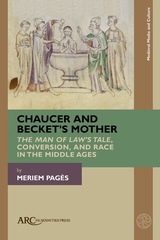
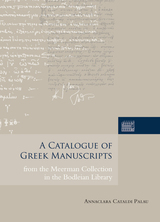
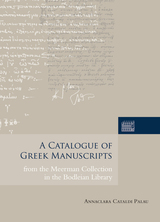
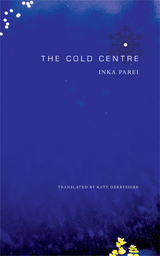
Written in Parei’s characteristically precise prose, The Cold Centre is a timely reminder of how we react to accidents—nuclear and otherwise— and a bleakly realistic description of East Berlin before the Wall fell. Its tight and dizzying structure keeps readers on the edge of their seats as the narrator tries to solve his mystery.

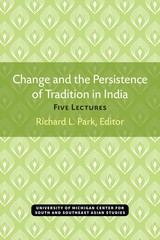
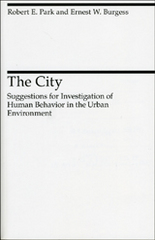
"It is a classic which remains relevant largely because it poses questions still unresolved."—Choice
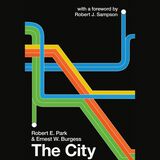
First published in 1925, The City is a trailblazing text in urban history, urban sociology, and urban studies. Its innovative combination of ethnographic observation and social science theory epitomized the Chicago school of sociology. Robert E. Park, Ernest W. Burgess, and their collaborators were among the first to document the interplay between urban individuals and larger social structures and institutions, seeking patterns within the city’s riot of people, events, and influences. As sociologist Robert J. Sampson notes in his new foreword, though much has changed since The City was first published, we can still benefit from its charge to explain where and why individuals and social groups live as they do.
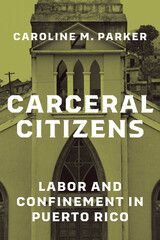
In Carceral Citizens, anthropologist Caroline M. Parker offers an ethnographic portrait of therapeutic communities in Puerto Rico, the oldest colony in the Americas. Non-profit entities nested within the carceral state, therapeutic communities serve as reeducation and recovery centers for mostly male drug offenders who serve out their sentences engaged in manual labor and prayer. The most surprising aspect of these centers, however, is that their “graduates” often stay there long after the completion of their terms, working as self-appointed counselors in a mixture of volunteer and low-wage positions.
Parker seeks to explain this fact by showing how, in these therapeutic communities, criminalized men find ways of carving out a meaningful existence. Through their participation in the day-to-day functioning of the centers, they discover and cultivate alternative forms of belonging, livelihood, and citizenship, despite living within the restrictions of the carceral state. Situating her study against the backdrop of Puerto Rico’s colonial history, and with findings that extend across Latin America, Parker aims to challenge common assumptions about confinement, labor, and rehabilitation. By delving into lives shaped by the convergence of empire, the carceral state, and self-help, she offers a fresh understanding of the transformations of labor and social life brought about by mass incarceration.
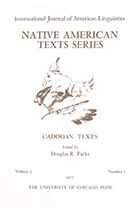

Children are increasingly a focus of international and national courts and truth commissions. Their participation, including through testimony that bears witness to their experiences, demonstrates their critical role in truth, justice, and reconciliation processes. If children are to engage, however, their rights must be respected.
This book includes analysis of the recent involvement of children in transitional justice processes in Liberia, Peru, Sierra Leone, and South Africa. It also explores key areas of current debates among legal scholars and child rights advocates, such as international criminal responsibility, traditional and restorative justice, reparations, psychosocial support for child witnesses, and links between education and reconciliation.
The book emphasizes how children must be engaged during post-conflict transition. If children are excluded, they may become vulnerable to a continuing cycle of violence, affecting future generations. In contrast, through active involvement in transitions, children and adolescents can be the catalysts for justice, reconciliation, and peace-building within their own families and communities.

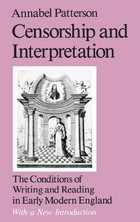
Annabel Patterson explores the effects of censorship on both writing and reading in early modern England, drawing analogies and connections with France during the same period.

A New York Times Book Review Editors’ Choice
Winner of a PROSE Award
“Fascinating…Eye-opening…Illuminating…Patterson carefully explores the complexity of the structural machinery behind Jamaica’s dazzling successes and dismal failures.”
—Carrie Gibson, New York Times Book Review
“In the ruins of postcolonial Jamaica, Patterson unearths a vibrant popular culture, centered in particular on dancehall music, that can provide new resources to address the postcolonial predicament.”
—Adom Getachew, The Nation
“Masterful…A memorable, nuanced, and insightful social analysis of the island and its place in global history. Highly recommended.”
—Daron Acemoglu, coauthor of Why Nations Fail
There are few places more puzzling than Jamaica. Jamaicans claim their home has more churches per square mile than any other country, yet it is one of the most murderous nations in the world. Its reggae superstars and celebrity sprinters outshine musicians and athletes in countries many times its size. Jamaica’s economy is anemic and many of its people impoverished, yet they are, according to international surveys, some of the happiest on earth. In The Confounding Island, Orlando Patterson returns to the place of his birth to reckon with its contradictions.
Patterson investigates the failures of Jamaica’s postcolonial democracy, exploring why the country has been unable to achieve broad economic growth and why its free elections and stable government have been unable to address violence and poverty. If we look closely at the Jamaican example, we see the central dilemmas of globalization, economic development, poverty reduction, and postcolonial politics thrown into stark relief.


This book is a resource for all those interested in learning more about childhood cancer, including health practitioners, family, and friends. These stories also have the potential to help other youth diagnosed with cancer.
All of the proceeds received by the University of Michigan Division of Pediatric Hematology/Oncology for this book will be donated: 50% to the Block Out Cancer campaign for pediatric cancer research at the University of Michigan and 50% to the Child and Family Life Program at the University of Michigan C.S. Mott Children’s Hospital.

Detailed directions are given for reaching the noted as well as the little-known localities in all sections of this great mineral-producing state. Included are numerous mileage logs never before published, and many sketch maps made especially for this book. A unique system arranges the localities along segments of the main highways.
Latest information is given on local travel and collecting conditions and land ownership, so much desired by collectors who want to make the best use of their time. Gem and mineral societies that welcome visitors — museums that display outstanding collections — are all described. Official maps and references to the literature are listed.

The first six volumes of the Collected Papers of Charles Sanders Peirce included Peirce’s main writings in general philosophy, logic (deductive, inductive, and symbolic), pragmatism, and metaphysics. Volumes VII and VIII are a continuation of this series. Originally published as two separate volumes, they now appear in one book as part of the Belknap Press edition. Volume VII contains papers on experimental science, scientific method, and philosophy of mind. Volume VIII contains selections from Peirce’s reviews and correspondence and a bibliography of his published works, speeches and correspondence, and works by other authors which quote or describe manuscripts by Peirce which are not included in Volumes I–VIII of Collected Papers.
As is true of the series as a whole, the material in these volumes is not readily accessible elsewhere. Many of the manuscripts have never been published before, and the previously published material which is included is widely scattered in a number of journals.
Peirce’s work in experimental science played an important role in his life and in the formation of his philosophy, and Volume VII is designed to show how the principal focus of his attention shifted from this sphere to the methods of science and finally to speculative metaphysics. Thus it includes his only published article in experimental psychology and two short pieces on gravity as well as the most important part of “The Logic of 1873” (in which pragmatism was first formulated in writing); “The Logic of Drawing History from Ancient Documents,” discussion of the historical method; “Economy of Research” (1879), containing many pertinent reflections on scientific methodology of interest to research directors today; and much more.
America’s first original philosopher and logician, and the founder of the philosophy of pragmatism, Peirce was also influential in shaping the thinking of such figures as William James and John Dewey. The reviews and correspondence contained in Volume VIII show his attitude toward these philosophies and illustrate the nature of his relationships with the great thinkers of his day.
The bibliography in Volume VIII lists chronologically all of Peirce’s known published works, giving a clear picture of the development of his thought from 1860 through 1911. It is more complete than any published so far in that many new items are included and items previously listed in different sources are here brought together.
These volumes will be of great value to all persons interested in philosophy, scientific method, psychology, the methodology of history, and American studies in general.


This volume contains the published contributions of one of the founders of modern logic and America’s greatest logical genius. It is not only of historical but of contemporary interest because of its many acute discussions of fundamental logical problems. To assist the general reader, the editors have prefixed to the text a selected list of important topics and have provided many footnotes and an exhaustive index.
The present, the longest volume of the series of Peirce’s Collected Papers, reveals most clearly his stature as a logician and a student of the foundations of mathematics. It includes not only some striking anticipations of recent work in logic and the foundations of mathematics but also a number of vital contributions to these subjects as now understood. In addition there is an entirely original treatment of logical diagrams which makes possible a detailed analysis of the process of reasoning and provides the link between modern logic and Peirce’s conception of pragmatism. It is the most advanced and important of the volumes on exact logic.









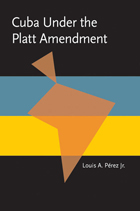
This book examines the early years of the Cuban Republic, launched in 1902 after the war with Spain. Although no longer a colony, the country was still hobbled by continuing dependence on and exploitation from a foreign power. Pérez shows how U.S. armed intervention in Cuba in 1898 and subsequent military occupation revitalized elements of the colonial system that would serve imperialist interests during independence. The concessions of the Platt Amendment in 1903 became the principal instrument for U.S. expansion in Cuba. The U.S. then gained control over resources and markets.
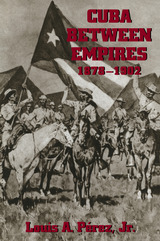
Cuban independence arrived formally on May 20, 1902, with the raising of the Cuban flag in Havana - a properly orchestrated and orderly inauguration of the new republic. But something had gone awry. Republican reality fell far short of the separatist ideal. In an unusually powerful book that will appeal to the general reader as well as to the specialist, Louis A. Perez, Jr., recounts the story of the critical years when Cuba won its independence from Spain only to fall in the American orbit.
The last quarter of the nineteenth century found Cuba enmeshed in a complicated colonial environment, tied to the declining Spanish empire yet economically dependent on the newly ascendant United States. Rebellion against Spain had involved two generations of Cubans in major but fruitless wars. By careful examination of the social and economic changes occurring in Cuba, and of the political content of the separatist movement, the author argues that the successful insurrection of 1895-98 was not simply the last of the New World rebellions against European colonialism. It was the first of a genre that would become increasingly familiar in the twentieth century: a guerrilla war of national liberation aspiring to the transformation of society.
The third player in the drama was the United States. For almost a century, the United States had pursuedthe acquistion of Cuba. Stepping in when Spain was defeated, the Americans occupied Cuba ostensibly to prepare it for independence but instead deliberately created institutions that restored the social hierarchy and guaranteed political and economic dependence. It was not the last time the U.S. intervention would thwart the Cuban revolutionary impulse.



Cuban Studies has been published annually by the University of Pittsburgh Press since 1985. Founded in 1970, it is the preeminent journal for scholarly work on Cuba. Each volume includes articles in both English and Spanish, a large book review section, and an exhaustive compilation of recent works in the field.
Widely praised for its interdisciplinary approach, and trenchant analysis of an array of topics, each volume features the best scholarship in the humanities and social sciences. Cuban Studies 36 includes articles on economics, politics, racial and gender issues, and the exodus of Cuban Jewry in the early 1960s, among others. Contributing authors are: Kenya C. Dworkin y Méndez, Beatriz Calvo Peña, Mary Speck, Luz Mena, Gema R. Guevara and Dana Evan Kaplan.

Cuban Studies has been published annually by the University of Pittsburgh Press since 1985. Founded in 1970, it is the preeminent journal for scholarly work on Cuba. Each volume includes articles in both English and Spanish, a large book review section, and an exhaustive compilation of recent works in the field.
Widely praised for its interdisciplinary approach and trenchant analysis of an array of topics, each volume features the best scholarship in the humanities and social sciences. Cuban Studies 37 includes articles on environmental law, economics, African influence in music, irreverent humor in postrevolutionary fiction, international education flow between the United States and Cuba, and poetry, among others.

Cuban Studies has been published annually by the University of Pittsburgh Press since 1985. Founded in 1970, it is the preeminent journal for scholarly work on Cuba. Each volume includes articles in both English and Spanish, a large book review section, and an exhaustive compilation of recent works in the field.
Widely praised for its interdisciplinary approach and trenchant analysis of an array of topics, each volume features the best scholarship in the humanities and social sciences. Cuban Studies 38 includes essays on the politics of liberation, including: the competing strands of liberalism emanating from Havana in the early nineteenth century; Jose Martí's theory of psychocoloniality; and the relationship between sugar planters, insurgents, and the Spanish military during the revolution. This volume also reflects on cultural themes, such as the new aesthetics of the everyday in Cuban cinema, the “recovery” of poet José Angel Buesa, and the meaning of Elián Gonzales in the context of life in Miami.

Cuban Studies 39 includes essays on: the recent transformation of the Cuban film animation industry and its continuing cultural impact; the influence of the liberal agenda of Justo Rufino Barrios on Jose Martí; a profile of the music of the Special Period and its social commentary; an in-depth examination of the contents, important themes, and enormous research potential of the Miscelánea de Expedientes collection at the Cuban National Archive; and a realistic assessment on the political future of Cuba.
Beginning with volume 34 (2003), the publication is available electronically through Project MUSE®. More information can be found at http://muse.jhu.edu/publishers/pitt_press/.

Cuban Studies 40 features a broad spectrum of articles, including essays on: the role of race in the revolution of 1933; the subject of disaster in eighteenth-century Cuban poetry; developments in Cuban historiography over the past fifty years; a profile of the work of historian José Vega Suñol; and a remembrance of essayist and literary critic Nara Araújo, who also contributed an article on travel in Cuba for this volume.
Beginning with Cuban Studies 34 (2003), the publication is available electronically through Project MUSE®. More information can be found at http://muse.jhu.edu/publishers/pitt_press/.
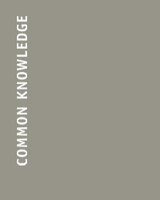
Described by the New York Times as one of two American journals in which public intellectuals and other scholars prefer to publish, the highly acclaimed Common Knowledge has returned to publication after a two-year hiatus. In an effort to place itself in the ferment of intellectual life and broaden its geographical range, the journal has moved to the Middle East, to Israel. Born in an attempt to moderate and get past the "culture wars" of the 90s, Common Knowledge has moved, literally, to a war zone, and accordingly its editorial interests have broadened to include culture wars of a less metaphorical kind.
Its mission is both incredibly ambitious and shockingly simple: to open up lines of communication between the academy and the community of thoughtful people outside its walls. Common Knowledge was created to form a new intellectual model, one based on conversation or cooperation rather than on metaphors adopted from sports and war, of "sides" that one must "take." The journal will collect work from a variety of fields and specialties, including philosophy, religion, psychology, literary criticism, cultural studies, art history, political science, and social, cultural, and intellectual history.
Scholars such as Richard Rorty, Bruno Latour, Clifford Geertz, Julia Kristeva, Karma Nabulsi, and J. G. A. Pocock will cross paths with political figures like Prince Hassan of Jordan and President Arpad Goncz of Hungary, novelists like Susan Sontag, poets like Yves Bonnefoy, composers like Alexander Goehr, and journalists like Adam Michnik. The pages of Common Knowledge are sure to challenge the ways we think about theory and its relevance to humanity. The first volume will feature the beginning of a Seriatim Symposium, “Disagreement, Enmity, and Dispute,” which will include discussions of the title concepts from a variety of theoretical perspectives. The Symposium asks why, in an intellectual context in which “true” and “real” are words that can be used only in condescending scare quotes, there is so much absolute conflict. If truth and reality are constructions, then why aren’t we constructing consensual orders (metaphysical and social) that are conducive to peace, calm, and cooperation?
Contributors for forthcoming issues include: Manfred Frank, Jacques Le Goff, Vicki Hearne, Sissela Bok, Edward Cardinal Cassidy, Linda Hutcheon, G. Thomas Tanselle, Arlette Farge, Marcel Detienne, Caryl Emerson, Stanley Katz, and Peter Laslett.
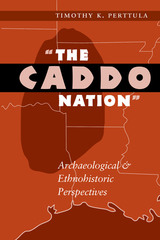
First published in 1992 and now updated with a new preface by the author and a foreword by Thomas R. Hester, "The Caddo Nation" investigates the early contacts between the Caddoan peoples of the present-day Texas, Louisiana, Oklahoma, and Arkansas region and Europeans, including the Spanish, French, and some Euro-Americans.
Perttula's study explores Caddoan cultural change from the perspectives of both archaeological data and historical, ethnographic, and archival records. The work focuses on changes from A.D. 1520 to ca. A.D. 1800 and challenges many long-standing assumptions about the nature of these changes.


A long history of migration, trade, and shared interests links China to Latin America and the Caribbean. Over the past twenty years, China has increased direct investment and restructured trade relations in the region. In addition, Chinese public sector enterprises, private companies, and various branches of the central government have planned, developed, and built a large number of infrastructure projects in Latin America and the Caribbean, such as dams, roads, railways, energy grids, security systems, telecommunication networks, hospitals, and schools. These projects have had a profound impact on local environments and economies and help shape the lived experiences of individuals. Each chapter in this volume examines how the impact of these infrastructure projects varies in different countries, focusing on how they produce new forms of global connectivity between various sectors of the economy and the resulting economic and cultural links that permeate everyday life
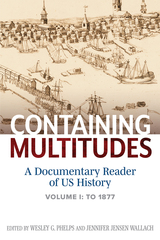
Containing Multitudes: A Documentary Reader of US History provides nearly two hundred primary documents that narrate aspects of US history from the period before European contact through the twenty-first century. Presented in two volumes, this curated selection—including letters, literature, journalism, and visual art—provides access to historical voices from a wide range of subject positions and belief systems.
Designed for US history survey courses, this reader provides both analysis and instructional support in the form of brief introductory essays and questions to promote student discussion and reflection. Containing Multitudes not only conveys a rich and complex portrait of the American past but also offers readers valuable insight into the many dimensions of the historian’s craft.
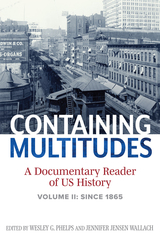
This two-volume work includes nearly two hundred primary documents and images that narrate many aspects of United States history from the period before European contact and colonization through the twenty-first century. The sources assembled capture the voices of Americans of varied age, race, ethnicity, and gender, historical actors who represent not only diverse subject positions but also a wide variety of belief systems and varied circumstances. Combined with interpretive headnotes and discussion questions, the layered approaches of the contributors deliver an unusually complex and rich portrait of the American past while also offering readers glimpses of the many dimensions of the historians’ craft.


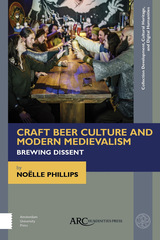

By combining stories of care, the reflections of caregiving practitioners, and interpretations of caregiving within a larger social and theoretical framework, this collection identifies the values and skills involved in quality caregiving at the individual level and affirms their importance for reshaping our public caregiving institutions. Contributors from the fields of medicine, nursing, teaching, ministry, sociology, psychotherapy, theology, and philosophy articulate their values, hopes, commitments, and practices both in theoretical essays and in narratives of caregiving that reveal the complexities of skillful practice.

Born to Chinese-Cambodian parents in France, Jean-Baptiste Phou has pursued a diverse artistic career since 2008. Through his public views and artistic works, he has focused mainly on the experiences of Asians in France. Up until now, he’s always been careful not to raise issues of sexuality—in particular, his homosexuality.
In this searing memoir, Phou faces his fears and shame to examine the role his ethnic origin has played in the construction of his sexual identity and his romantic relationships in a predominantly white environment. An astute observer of the various ways in which his body has been perceived, Phou explores how these perceptions have shaped his relationship with himself and others. How does a marginalized person develop emotionally and build, reclaim, and express their sexuality? Drawing on various works of history, sociology, gender studies, literature, and popular culture, Phou sensitively examines various strategies developed in response to this question.
Being gay in a largely straight world is difficult but being Asian within this sexual minority can be a doubly oppressive experience. Coming Out of My Skin deftly tackles this challenge and aspires for a reconciliation that can empower people of sexual and racial minorities to joyfully inhabit their bodies.
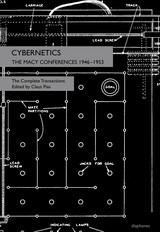
This book contains the complete transcripts of all ten Macy conferences and the guidelines for the conference proceedings. These transcripts are supplemented with an introduction by Claus Pias that charts the significance of the Macy conferences to the history of science.
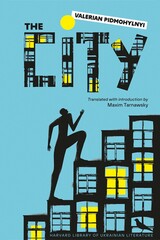
Valerian Pidmohylnyi’s The City was a landmark event in the history of Ukrainian literature. Written by a master craftsman in full control of the texture, rhythm, and tone of the text, the novel tells the story of Stepan, a young man from the provinces who moves to the capital of Ukraine, Kyiv, and achieves success as a writer through a succession of romantic encounters with women.
At its core, the novel is a philosophical search for harmony in a world where our intellectual side expects rational order, whereas the instinctive natural world follows its own principles. The resulting alienation and disorientation reflect the basic principles of existential philosophy, in which Pidmohylnyi is close to his European counterparts of the day.

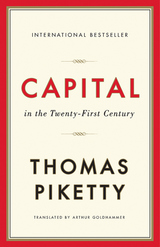
A New York Times #1 Bestseller
An Amazon #1 Bestseller
A Wall Street Journal #1 Bestseller
A USA Today Bestseller
A Sunday Times Bestseller
A Guardian Best Book of the 21st Century
Winner of the Financial Times and McKinsey Business Book of the Year Award
Winner of the British Academy Medal
Finalist, National Book Critics Circle Award
“It seems safe to say that Capital in the Twenty-First Century, the magnum opus of the French economist Thomas Piketty, will be the most important economics book of the year—and maybe of the decade.”
—Paul Krugman, New York Times
“The book aims to revolutionize the way people think about the economic history of the past two centuries. It may well manage the feat.”
—The Economist
“Piketty’s Capital in the Twenty-First Century is an intellectual tour de force, a triumph of economic history over the theoretical, mathematical modeling that has come to dominate the economics profession in recent years.”
—Steven Pearlstein, Washington Post
“Piketty has written an extraordinarily important book…In its scale and sweep it brings us back to the founders of political economy.”
—Martin Wolf, Financial Times
“A sweeping account of rising inequality…Piketty has written a book that nobody interested in a defining issue of our era can afford to ignore.”
—John Cassidy, New Yorker
“Stands a fair chance of becoming the most influential work of economics yet published in our young century. It is the most important study of inequality in over fifty years.”
—Timothy Shenk, The Nation
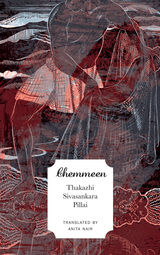
Previously available only in India, this hugely successful novel was adapted into a film, winning great critical acclaim and commercial success. Anita Nair’s evocative translation from Malayalam brings this tale of love and longing, a classic of Indian literature, to a new audience.
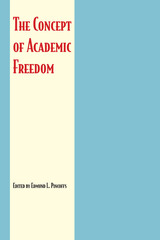
Most professors and administrators are aware that academic freedom is in danger of being brushed aside by a public that has little understanding of what is at stake. They may be only marginally aware that the defense of academic freedom is endangered by certain confusions concerning the nature of academic freedom, the criteria for its violation, and the structure of an adequate justification for claims to it. These confusions were enshrined in some of the central documents on the subject, including the 1940 Statement on Academic Freedom and Tenure, agreed upon by the American Association of University Professors and the Association of American Colleges and endorsed by many professional organizations. Careful analysis of them will not do away with debate; it will bring the debate into focus, so that attacks on academic freedom can be appraised as near or far away from the center of the target and can then be appropriately answered.
Nearly all the contemporary writing on academic freedom consists of attack or defense. The Concept of Academic Freedom is the first book to deal exclusively with fundamental conceptual issues underlying the battle. In the discussion of these issues, certain philosophical positions crystallize: radical versus liberal conceptions of the status and function of university teachers, specific versus general theories of academic freedom, consequential versus nonconsequential theories of justification. Partisans (and enemies) of academic freedom would do well to decide on which side of these divisions they stand, or how they would mediate between sides. Otherwise many questions will remain unclear: What is under discussion—a special right peculiar to academics or a general right that is especially important to academics? Is justification of that right possible? Can the right be derived from other rights, or from the theory of justice or of democratic society? Or is the argument for academic freedom one that more properly turns on the consequences for society as a whole if that freedom is not protected?
The essays in this book explore these and other problems concerning the defense of academic freedom by radicals, the justification for disruption on campus, and the control of research.
Contributors to the volume include Hugo Adam Bedau, Bertram H. Davis, Milton Fisk, Graham Hughes, Alan Pasch, Hardy E. Jones, Alexander Ritchie, Amelie Oksenberg Rorty, Rolf Sartorius, T. M. Scanlon, Richard Schmitt, John R. Searle, Judith Jarvis Thomson, and William Van Alstyne. All are outstanding in their fields. Many have had practical experience in the legal profession or with the American Association of University Professors on the issue of academic freedom.

The Collected letters of Sir Arthur Pinero was first published in 1974. Minnesota Archive Editions uses digital technology to make long-unavailable books once again accessible, and are published unaltered from the original University of Minnesota Press editions.
Sir Arthur Pinero's letters, in the collection published in this volume, present a vivid, behind-the-scenes look at the theater in England in the late nineteenth and early twentieth centuries. Sir Arthur was one of the most important and influential playwrights of the English stage during his lifetime. These letters, 337 in number, most of which have not been published before, span a period of sixty years, from 1873, when Pinero began his career as an actor at the age of eighteen, to 1933, the year before his death.
Pinero was totally absorbed with the theater, and his correspondence provides a record of his ideas about his own work and the contemporary theatrical climate. From his earlier years he gives us impressions of the famous actors and actresses of the period—Henry Irving, Ellen Terry, and the Bancrofts, who were his favorites—and he later acted with them, too.
The letters trace well the growth of Pinero's work as a dramatist, and are especially valuable because he wrote little publicly on dramatic theory in general or on his own work in particular. They reveal a dramatist who knew exactly what he wanted in the theater and how he felt it ought to be realized on the stage. He devoted much time and discussion to the careful choosing of a cast and other aspects of production. The letters tell, with as well as reporting on the critical and public reception of his plays. The correspondence also demonstrates his involvement with the development of the native English drama in its own right, and includes forthright comments on Ibsen and on continental drama generally.
Many of the letters are addressed to such notables as Henry James, Edmund Gosse, George Bernard Shaw, Henry Irving, and Sir George Alexander, all major theatrical figures at the turn of the century.
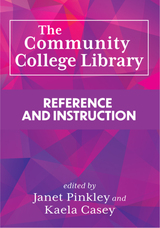
Community college librarians are engaged in meaningful work designing and delivering library programs and services that meet the needs of their diverse populations and support student learning. The Community College Library series is meant to lift the voices of community college librarians and highlight their creativity, tenacity, and commitment to students.
The Community College Library: Reference and Instruction collects research, programs, and new approaches to reference and instruction implemented by community college librarians around the U.S. Chapters include sample activities and materials and cover topics including using race-centered and trauma-informed practices in the reference interview; incorporating online workshops into an existing information literacy program; and using student-driven pedagogy to navigate the early stages of research.
This book demonstrates the innovative and replicable ways community college librarians are meeting the information and research needs of their college population both in person and remotely, all while providing a safe, inclusive space for students to explore and learn.
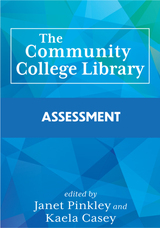
Community college librarians are engaged in meaningful work designing and delivering library programs and services that meet the needs of their diverse populations and support student learning. The Community College Library series is meant to lift the voices of community college librarians and highlight their creativity, tenacity, and commitment to students.
The Community College Library: Assessment explores the research, comprehensive plans, and new approaches to assessment being created by community college librarians around the U.S. Chapters include sample activities and materials and cover topics including assessing student learning while shifting from Standards to Framework; investigating and communicating library instruction’s relationship to student retention; and building librarian assessment confidence through communities of research practice.
This book demonstrates the innovative and replicable ways community college librarians are measuring, evaluating, and reflecting on the services they provide, and how to use these assessments to demonstrate the value and impact of library services and advocate for resources.
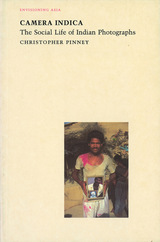
These quiet but moving images represent the changing role of photographic portraiture in India, a topic anthropologist Christopher Pinney explores in Camera Indica. Studying photographic practice in India, Pinney traces photography's various purposes and goals from colonial through postcolonial times. He identifies three key periods in Indian portraiture: the use of photography under British rule as a quantifiable instrument of measurement, the later role of portraiture in moral instruction, and the current visual popular culture and its effects on modes of picturing. Photographic culture thus becomes a mutable realm in which capturing likeness is only part of the project. Lavishly illustrated, Pinney's account of the change from depiction to invention uncovers fascinating links between these evocative images and the society and history from which they emerge.

Simon Pirani investigates the interaction of power, money and people in Russia during the presidencies of Vladimir Putin and his successor Dmitry Medvedev.
Profiling the Putin team, including contingents from the security services and pro-market economic "reformers", Pirani argues that the economic growth it presided over during the oil boom was one-sided. The gap between rich and poor widened. Now the boom is over, inequalities will multiply further. As well as explaining Russia's economic trajectory, the book provides a unique account of the social movements that are working against an increasingly authoritarian government to change Russia for the better.
This is the perfect introduction for undergraduates approaching Russia for the first time and those who wish to know how Russia will change during the economic crisis.


On names, forms, beauty, and lies.
Plato, the great philosopher of Athens, was born in 427 BC. In early manhood an admirer of Socrates, he later founded the famous school of philosophy in the grove Academus. Much else recorded of his life is uncertain; that he left Athens for a time after Socrates’ execution is probable; that later he went to Cyrene, Egypt, and Sicily is possible; that he was wealthy is likely; that he was critical of “advanced” democracy is obvious. He lived to be 80 years old. Linguistic tests including those of computer science still try to establish the order of his extant philosophical dialogues, written in splendid prose and revealing Socrates’ mind fused with Plato’s thought.
In Laches, Charmides, and Lysis, Socrates and others discuss separate ethical conceptions. Protagoras, Ion, and Meno discuss whether righteousness can be taught. In Gorgias, Socrates is estranged from his city’s thought, and his fate is impending. The Apology (not a dialogue), Crito, Euthyphro, and the unforgettable Phaedo relate the trial and death of Socrates and propound the immortality of the soul. In the famous Symposium and Phaedrus, written when Socrates was still alive, we find the origin and meaning of love. Cratylus discusses the nature of language. The great masterpiece in ten books, the Republic, concerns righteousness (and involves education, equality of the sexes, the structure of society, and abolition of slavery). Of the six so-called dialectical dialogues Euthydemus deals with philosophy; metaphysical Parmenides is about general concepts and absolute being; Theaetetus reasons about the theory of knowledge. Of its sequels, Sophist deals with not-being; Politicus with good and bad statesmanship and governments; Philebus with what is good. The Timaeus seeks the origin of the visible universe out of abstract geometrical elements. The unfinished Critias treats of lost Atlantis. Unfinished also is Plato’s last work, Laws, a critical discussion of principles of law which Plato thought the Greeks might accept.
The Loeb Classical Library edition of Plato is in twelve volumes.

Mostly doubtful dialogues.
Plato, the great philosopher of Athens, was born in 427 BC. In early manhood an admirer of Socrates, he later founded the famous school of philosophy in the grove Academus. Much else recorded of his life is uncertain; that he left Athens for a time after Socrates’ execution is probable; that later he went to Cyrene, Egypt, and Sicily is possible; that he was wealthy is likely; that he was critical of “advanced” democracy is obvious. He lived to be 80 years old. Linguistic tests including those of computer science still try to establish the order of his extant philosophical dialogues, written in splendid prose and revealing Socrates’ mind fused with Plato’s thought.
In Laches, Charmides, and Lysis, Socrates and others discuss separate ethical conceptions. Protagoras, Ion, and Meno discuss whether righteousness can be taught. In Gorgias, Socrates is estranged from his city’s thought, and his fate is impending. The Apology (not a dialogue), Crito, Euthyphro, and the unforgettable Phaedo relate the trial and death of Socrates and propound the immortality of the soul. In the famous Symposium and Phaedrus, written when Socrates was still alive, we find the origin and meaning of love. Cratylus discusses the nature of language. The great masterpiece in ten books, the Republic, concerns righteousness (and involves education, equality of the sexes, the structure of society, and abolition of slavery). Of the six so-called dialectical dialogues Euthydemus deals with philosophy; metaphysical Parmenides is about general concepts and absolute being; Theaetetus reasons about the theory of knowledge. Of its sequels, Sophist deals with not-being; Politicus with good and bad statesmanship and governments; Philebus with what is good. The Timaeus seeks the origin of the visible universe out of abstract geometrical elements. The unfinished Critias treats of lost Atlantis. Unfinished also is Plato’s last work, Laws, a critical discussion of principles of law which Plato thought the Greeks might accept.
The Loeb Classical Library edition of Plato is in twelve volumes.

Plautus (Titus Maccius), born about 254 BCE at Sarsina in Umbria, went to Rome, engaged in work connected with the stage, lost his money in commerce, then turned to writing comedies.
Twenty-one plays by Plautus have survived (one is incomplete). The basis of all is a free translation from comedies by such writers as Menander, Diphilus, and Philemon. So we have Greek manners of Athens about 300250 BCE transferred to the Roman stage of about 225185, with Greek places, people, and customs, for popular amusement in a Latin city whose own culture was not yet developed and whose manners were more severe. To make his plays live for his audience, Plautus included many Roman details, especially concerning slavery, military affairs, and law, with some invention of his own, notably in management of metres. The resulting mixture is lively, genial and humorous, with good dialogue and vivid style. There are plays of intrigue (Two Bacchises, The Haunted House, Pseudolus); of intrigue with a recognition theme (The Captives, The Carthaginian, Curculio); plays which develop character (The Pot of Gold, Miles Gloriosus); others which turn on mistaken identity (accidental as in the Menaechmi; caused on purpose as in Amphitryon); plays of domestic life (The Merchant, Casina, both unpleasant; Trinummus, Stichus, both pleasant).
The Loeb Classical Library edition of Plautus is in five volumes.

Plautus (Titus Maccius), born about 254 BCE at Sarsina in Umbria, went to Rome, engaged in work connected with the stage, lost his money in commerce, then turned to writing comedies.
Twenty-one plays by Plautus have survived (one is incomplete). The basis of all is a free translation from comedies by such writers as Menander, Diphilus, and Philemon. So we have Greek manners of Athens about 300250 BCE transferred to the Roman stage of about 225185, with Greek places, people, and customs, for popular amusement in a Latin city whose own culture was not yet developed and whose manners were more severe. To make his plays live for his audience, Plautus included many Roman details, especially concerning slavery, military affairs, and law, with some invention of his own, notably in management of metres. The resulting mixture is lively, genial and humorous, with good dialogue and vivid style. There are plays of intrigue (Two Bacchises, The Haunted House, Pseudolus); of intrigue with a recognition theme (The Captives, The Carthaginian, Curculio); plays which develop character (The Pot of Gold, Miles Gloriosus); others which turn on mistaken identity (accidental as in the Menaechmi; caused on purpose as in Amphitryon); plays of domestic life (The Merchant, Casina, both unpleasant; Trinummus, Stichus, both pleasant).
The Loeb Classical Library edition of Plautus is in five volumes.




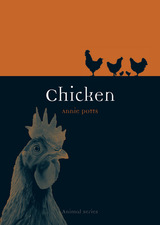
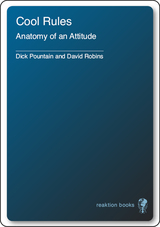
The contemporary Cool attitude is barely 50 years old, but its roots are older than that. Cool Rules traces Cool's ancient origins in European, Asian, and African cultures, its prominence in the African-American jazz scene of the 1940s, and its pivotal position within the radical subcultures of the 1950s and '60s. Pountain and Robins examine various art movements, music, cinema, and literature, moving from the dandies and flâneurs of the eighteenth and nineteenth centuries through to the expropriation of a whole cultural and psychological tradition by the media in the 1980s and '90s. What began as a rebellious posture adopted by minorities mutated to become mainstream itself. Cool is now primarily about consumption, as cynical advertisers have seized on it to create a constantly updated bricolage of styles and entertainments designed to affect the way people think about themselves and their society.
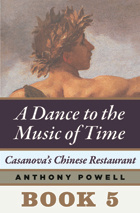
Anthony Powell’s universally acclaimed epic A Dance to the Music of Time offers a matchless panorama of twentieth-century London. Now, for the first time in decades, readers in the United States can read the books of Dance as they were originally published—as twelve individual novels—but with a twenty-first-century twist: they’re available only as e-books.
Casanova’s Chinese Restaurant (1960), the fifth book, finds Nick marrying Isobel Tolland and launching happily into family life—including his new role as brother-in-law to Isobel’s many idiosyncratic siblings. But even as Nick’s life is settling down, those of his friends are full of drama and heartache: his best friend, Hugh Moreland, is risking his marriage on a hopeless affair, while Charles Stringham has nearly destroyed himself with drink. Full of Powell’s typically sharp observations about life and love, Casanova’s Chinese Restaurant offers all the rewards and frustrations, pleasures and regrets of one’s thirties.
"Anthony Powell is the best living English novelist by far. His admirers are addicts, let us face it, held in thrall by a magician."—Chicago Tribune
"A book which creates a world and explores it in depth, which ponders changing relationships and values, which creates brilliantly living and diverse characters and then watches them grow and change in their milieu. . . . Powell's world is as large and as complex as Proust's."—Elizabeth Janeway, New York Times
"One of the most important works of fiction since the Second World War. . . . The novel looked, as it began, something like a comedy of manners; then, for a while, like a tragedy of manners; now like a vastly entertaining, deeply melancholy, yet somehow courageous statement about human experience."—Naomi Bliven, New Yorker
“The most brilliant and penetrating novelist we have.”—Kingsley Amis
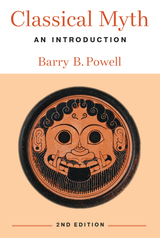
In Classical Myth: An Introduction, Barry B. Powell provides the historical and theoretical background necessary for us to understand not only the concept of what a myth is, but the cultural context of how it emerged, and the different approaches to interpreting myth that were put forward by ancient theorists and their more recent successors. Then he helps readers to understand classical myth as it is found in its primary sources: the works of Homer and Hesiod, and the Greek tragedians and historians, Ovid and Vergil. By examining a number of prominent themes in classical myth, this textbook explores the relationship between myth and art, politics, society, and history of the ancient world. This completely revised second edition features new illustrations and will help readers who want to understand myths or study their original sources.



Congress Versus the Supreme Court, 1957–1960 was first published in 1961. Minnesota Archive Editions uses digital technology to make long-unavailable books once again accessible, and are published unaltered from the original University of Minnesota Press editions.
This is an account of the effort made in the last two sessions of Congress to curb the Supreme Court because of certain liberal decisions of the Court, and an analysis of the reasons for the congressional failure. Many times in history Congress has objected to Court decisions and has tried to retaliate against the Court. The most recent period of difficulty traces back to the Court's school segregation decisions in 1954, but not until the Court took a liberal line in certain national security cases in 1956 and 1957 was an organized effort made in Congress to attack it. Professor Pritchett analyzes the specific decisions which aroused congressional concern and reviews the methods by which their reversal was sought. The failure of this effort to curb the Court is important to an understanding of the role of the Supreme Court in the American governmental system. This book is an expansion of the Guy Stanton Ford lectures given by Mr. Pritchett at the University of Minnesota.


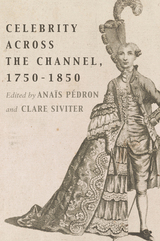

"Colonial Transformations in Venezuela" also provides a much-needed ethnohistorical approach to tropical Amazonia in general. In light of current debates over the nature of the colonial occupation and the ecological potential of the tropical forest as a site for human complexity and development, the papers gathered in this special issue bring new kinds of arguments and important new data to these issues. The articles also indicate important new lines of research for the understanding of native histories in a modern age of global connections.
Contributors include Rodrigo Navarrete, H. Dieter Heinen. Alvaro Garcia-Castro, Rafael A. Gassón, Silvia M. Vidal, Lilliam Arvelo, Franz Scaramelli, Kay Tarble, and Nelly Arvelo-Jiménez

China's Politics in Perspective was first published in 1962. Minnesota Archive Editions uses digital technology to make long-unavailable books once again accessible, and are published unaltered from the original University of Minnesota Press editions.
In a concise, readable diagnosis of present-day China, this book provides the perspective which is needed for a realistic view of the Chinese situation today.
Professor Quigley introduces the reader to contemporary political, economic, and social conditions on the mainland and on Nationalist-held Taiwan by briefly reviewing the basic tenets of Confucianism and other classical philosophies, the principal aspects of the imperial system, and the domestic and foreign influences which contributed to the collapse of monarchy in 1911. He recalls the revolutionary doctrine of Sun Yat-sen and surveys the nature and conduct of government under the first and second republics and the forces that operated for and against the transfer of liberal ideals from paper to practice. After showing how the Communist leadership gained its foothold and present control, he discusses the ideologies of Mao Tse-tung and Chiang Kai-shek, the structure and administration of their governments and major parties, their economic, social, and foreign policies, the independence movement on Taiwan, the prospects for democracy and the dilemma in which the United States has been placed by the victory of the Communists over a wartime ally.
In addition to being appropriate for general readers and for study groups interested in contemporary affairs, the book is especially suitable for use as a college text.
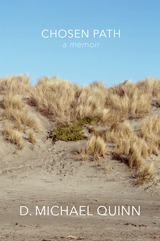
From the age of nine, Quinn felt convicted he would one day serve as an apostle of the Church of Jesus Christ of Latter-day Saints. He chose the path he believed would take him there, eventually living as a straight LDS family man in a mixed-orientation marriage. In the 1970s and 1980s he became a BYU professor and one of Mormonism’s most promising, prolific, and respected historians. But his uncompromising commitment to total honesty about his religion’s history, along with his homosexuality, set him on a collision course with church leaders and the end of his seemingly idyllic Mormon life. Throughout his telling, Quinn unflinchingly opens up about his feelings and experiences that shaped his enigmatic life.
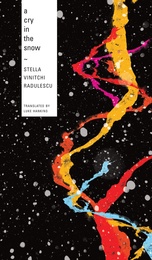

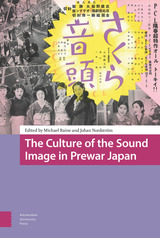
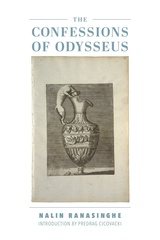
Predrag Cicovacki in his indispensable preface to the book, elucidates: “In Ranasinghe’s view, Odysseus is both the first recognizable human being and a model of curious and concupiscent human rationality that constantly strives toward the virtues of self-knowledge and moderation. Homer leads us to believe that the cosmos leans toward virtue, although its fundamental truths may be inherently unspeakable. This is the line of thought that Ranasinghe believes was further developed by Socrates, Plato, and Jesus, while being obscured by Aristotle, Augustine, and their followers. Homer’s later epic and his central insights are, according to Ranasinghe, the most fertile soil on which a humane civilization can grow and flourish.”
Yet Ranasinghe ultimately says it best. “Homer must be read as the wisest Greeks did, not for fantastic tales of the Olympians but because his myths reveal eternal constants of the human state: the soul’s ruling passions and the possibility of knowing and educating these false gods. Wrestled with thus the Iliad becomes a cautionary tale, not one urging literal reading or mindless mimesis. It may always be that for the few who grasp Homer, many more will obey his gods or imitate his antiheroes; but the Odyssey hints that while its poet sees this potential for misuse, he is willing to take a noble risk and hope that eros can listen to and educate thumos. This faith is implicit in his tale of Achilles and the Trojan War. It is vital today that we see how the West’s end resembles its angry origins, as depicted in the Iliad. This is why Homer is said to be as fresh as the morning newspaper. His wisdom may outlive our literacy.”
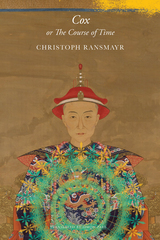
The world’s most powerful man, Qiánlóng, emperor of China, invites the famous eighteenth-century clockmaker Alister Cox to his court in Beijing. There, in the heart of the Forbidden City, the Englishman and his assistants are to build machines that mark the passing of time as a child or a condemned man might experience it and that capture the many shades of happiness, suffering, love, and loss that come with that passing.
Mystified by the rituals of a rigidly hierarchical society dominated by an unimaginably wealthy, god-like ruler, Cox musters all his expertise and ingenuity to satisfy the emperor’s desires. Finally, Qiánlóng, also known by the moniker Lord of Time, requests the construction of a clock capable of measuring eternity—a perpetuum mobile. Seizing this chance to realize a long-held dream and honor the memory of his late beloved daughter, yet conscious of the impossibility of his task, Cox sets to work. As the court is suspended in a never-ending summer, festering with evil gossip about the monster these foreigners are creating, the Englishmen wonder if they will ever escape from their gilded cage. More than a meeting of two men, one isolated by power, the other by grief, this is an exploration of mortality and a virtuoso demonstration that storytelling alone can truly conquer time.
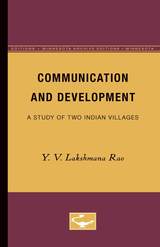
Communication and Development was first published in 1966. Minnesota Archive Editions uses digital technology to make long-unavailable books once again accessible, and are published unaltered from the original University of Minnesota Press editions.
What role does communication play in the economic, social, and political development of a community? The results of the study reported here, based on comprehensive field work in two small villages in India, throw considerable light on that question, one which is of fundamental importance to those concerned with rates and patterns of growth in any developing country.
In this study, the term "communication" refers to a social process—the flow of information, the circulation of knowledge and ideas in society, the propagation and internalization of thoughts. It does not refer to the media or means of communication, such as electronics, roads and railways, or vehicles.
The two villages studied, both in South India, were at contrasting stages of development. One was becoming industrialized, while the other still clung to such traditional ways as the barter system. To carry out the field work for his study, Dr. Rao lived in these villages for several months, talking at length with the people, obtaining information about their attitudes, beliefs, and opinions, and observing them and their surroundings with a trained eye. He also checked official records for pertinent information. He analyzes his findings from a psychological and sociological standpoint and, in addition, provides an intimate description of the village life.
The book will be of particular interest to communications specialists, anthropologists, sociologists, political scientists, economists, and others concerned with studies of the developing countries in Asia, Africa, and Latin America.
READERS
Browse our collection.
PUBLISHERS
See BiblioVault's publisher services.
STUDENT SERVICES
Files for college accessibility offices.
UChicago Accessibility Resources
home | accessibility | search | about | contact us
BiblioVault ® 2001 - 2024
The University of Chicago Press









